Are you tired of coming home to an empty apartment? Looking for a furry companion to brighten up your days? Well, look no further because the inquisitive and affectionate BoShih might just be the perfect fit for you.
This delightful mixed breed, a combination of a Shih Tzu and a Boston Terrier, brings together the best qualities of both parent breeds. But what makes the BoShih truly stand out is its size. Small enough to comfortably fit in your apartment, yet big enough to fill your heart with love and joy.
But there's more to this breed than meets the eye. Stay tuned to discover the fascinating world of the BoShih and why it could be the perfect apartment companion for you.
Key Takeaways
- BoShih, a mixed breed dog, is the perfect apartment companion due to their small size, inquisitive nature, and affectionate temperament.
- When choosing a dog for an apartment, factors such as quietness, low-energy levels, and good manners should be prioritized over size alone.
- Certain small dog breeds with higher energy levels can still thrive in apartments, so energy level should not be the sole determinant.
- Climate considerations are important, as some dogs may be more sensitive to noise, cold, or heat, requiring specific living conditions.
BoShih: A Mix of Shih Tzu and Boston Terrier
The BoShih, a mix of Shih Tzu and Boston Terrier breeds, is an adorable and affectionate companion for apartment living. With its small size, inquisitive nature, and loving personality, the BoShih inherits the best qualities from both parent breeds.
Also known as Boston Shih Tzus, these delightful dogs can often be found in shelters and breed-specific rescues, making adoption a great option. When considering a dog for apartment living, size isn't the only factor to consider. While BoShihs adapt well to apartment living, it's important to prioritize qualities such as being quiet, low-energy, calm indoors, and exhibiting good manners.
Factors to Consider for Apartment Living
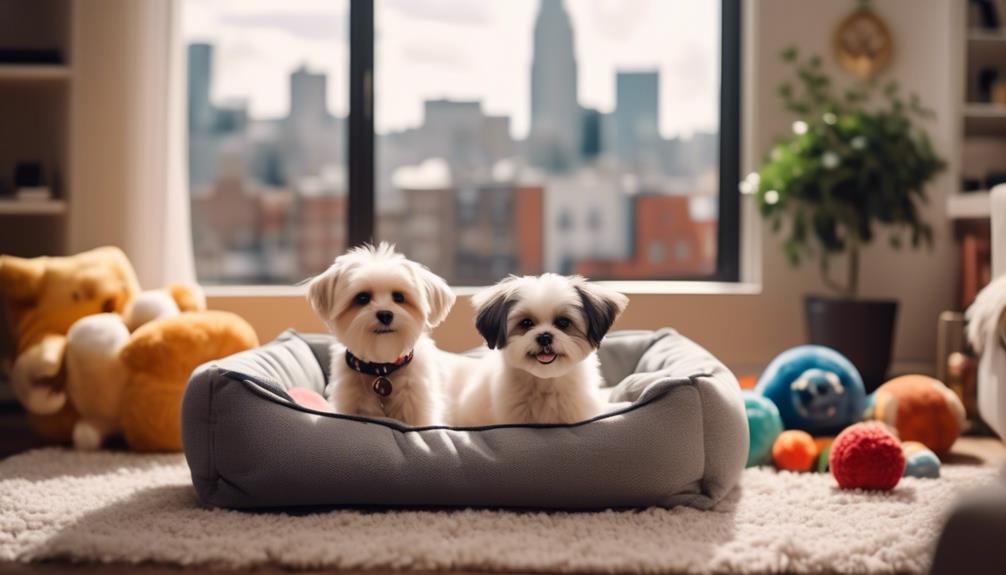
When choosing a dog for apartment living, it's important to consider factors beyond just size. While size is a consideration, it is not the sole determinant for apartment dogs. Certain larger breeds can adapt well to apartment living with lower activity levels, while some small dog breeds with higher energy levels can still thrive in apartments. Prioritizing qualities such as being quiet, low-energy, calm indoors, and exhibiting good manners is crucial. To help you choose the right dog for your apartment, here are some considerations:
| Factors to Consider |
|---|
| Size |
| Energy Level |
| Trainability |
| Sensitivity |
| Climate |
Size Is Not the Only Factor
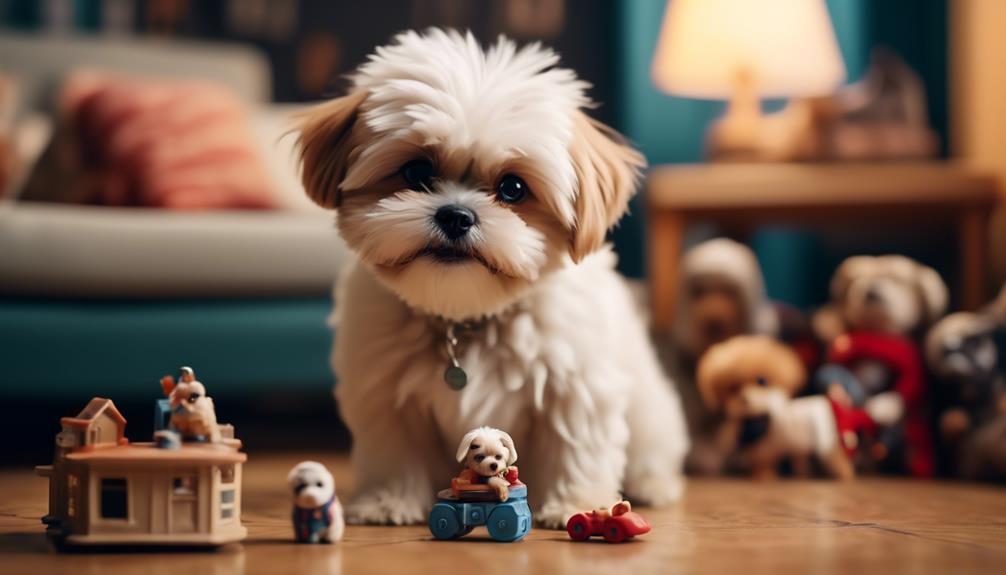
Considering a dog for apartment living? Remember, size isn't the only factor to consider. When choosing a dog for your apartment, there are several important factors to keep in mind:
- Compatibility: Find a dog breed that matches your lifestyle and energy level. A calm and low-energy dog will be more suitable for apartment living.
- Trainability: Look for a dog that's easy to train and exhibits good manners. This will ensure a harmonious living environment in your apartment.
- Sensitivity: Consider the dog's sensitivity level and resilience. Dogs with low sensitivity can better handle the noise and chaos of apartment living.
- Climate Adaptability: Take into account the dog's tolerance to different climates. Some breeds are more heat-sensitive or cold-sensitive, which may affect their comfort in an apartment.
Prioritize Quiet and Low-Energy Dogs
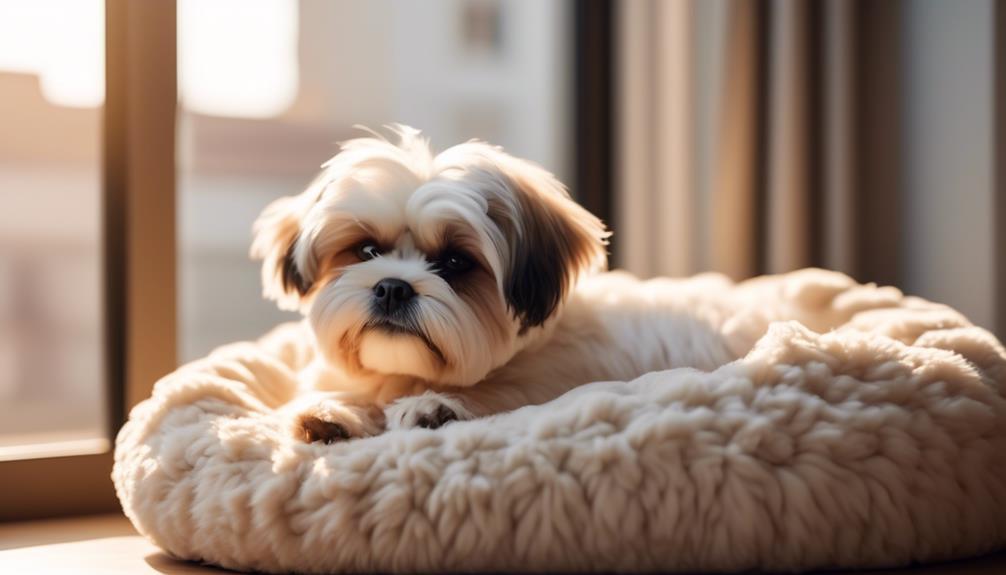
If you're looking for an apartment companion, remember to prioritize dogs that are quiet and low-energy. These types of dogs are more suitable for apartment living as they won't disturb your neighbors with excessive barking or require a lot of space to run around. Here are some breeds that fit the bill:
| Breed | Energy Level |
|---|---|
| Cavalier King Charles Spaniel | Low |
| Basset Hound | Low |
| Shih Tzu | Low |
| French Bulldog | Low |
These breeds are known for their calm and relaxed nature, making them perfect for apartment living. They are content with short walks and indoor playtime, making it easier for you to provide them with the exercise they need. Remember, a quiet and low-energy dog will be a great companion in your apartment, bringing you joy and love without causing any disturbance.
Certain Small Breeds Can Thrive in Apartments
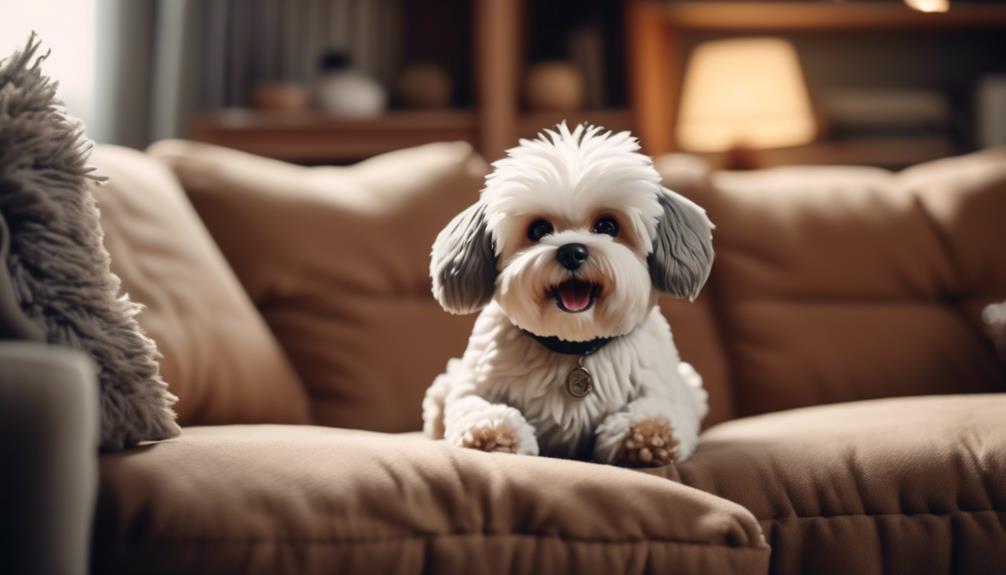
Certain small dog breeds can thrive in apartments, even if they've higher energy levels. Don't let their size fool you – these small pups have big personalities and can adapt well to apartment living.
Here are four reasons why certain small breeds can thrive in apartments:
- They're compact and don't require a lot of space.
- They're quiet and won't disturb your neighbors.
- They've low energy levels, so they won't demand excessive exercise.
- They're affectionate and make great companions in a smaller living space.
Considerations for Choosing a Dog
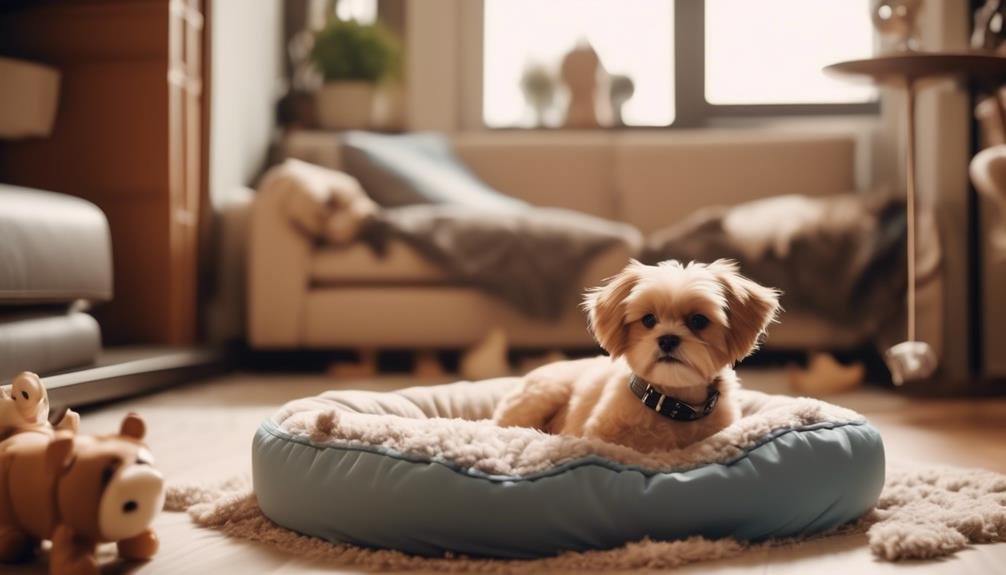
When choosing a dog, it is important to consider various factors that will contribute to a successful match for your lifestyle and living situation. Size alone should not be the sole determinant for apartment dogs. Some larger breeds can adapt well to apartment living with lower activity levels. Certain small dog breeds with higher energy levels can still thrive in apartments. Some dogs are easier than others and take to training better. Highly sensitive, independent thinking, or assertive dogs may be harder for first-time owners. Consider your dog-owning experience when choosing a dog. Take into account the dog's sensitivity level and resilience.
| Factors to Consider | Apartment Living Considerations |
|---|---|
| Size | Size alone should not be the sole determinant for apartment dogs. Some larger breeds can adapt well to apartment living with lower activity levels. Certain small dog breeds with higher energy levels can still thrive in apartments. |
| Temperament | Some dogs are easier than others and take to training better. Highly sensitive, independent thinking, or assertive dogs may be harder for first-time owners. |
| Experience | Consider your dog-owning experience when choosing a dog. Take into account the dog's sensitivity level and resilience. |
| Climate | Dogs have varying sensitivity levels. Low-sensitivity dogs can better handle a noisy and chaotic household. Dogs with low cold tolerance need to live inside in cool climates. Dogs with thick, double coats are more vulnerable to overheating. Breeds with short noses, like Bulldogs or Pugs, are also more heat-sensitive. |
Size Alone Is Not Enough
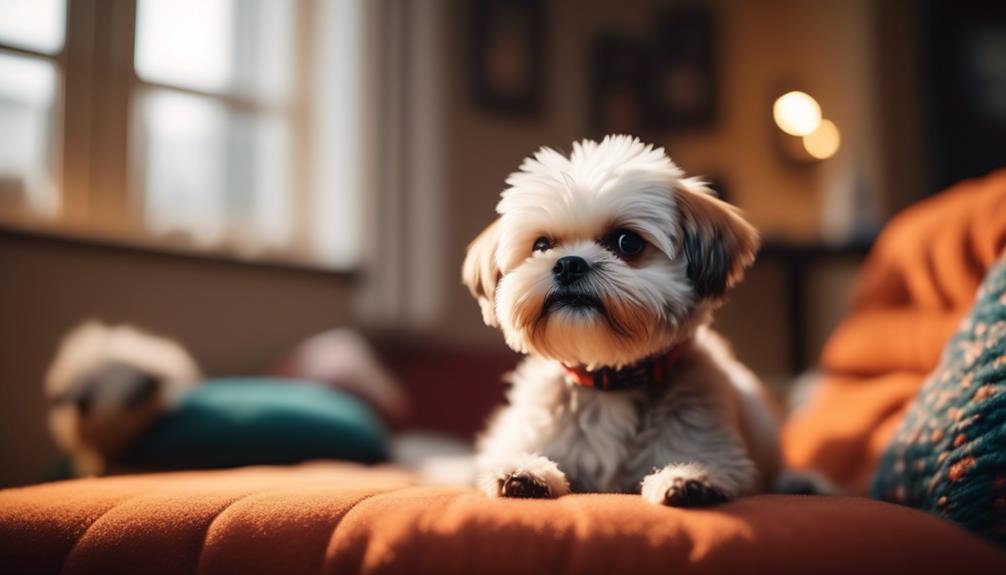
Choosing a dog for your apartment goes beyond considering size alone. While it's important to find a breed that fits within the space constraints of your living situation, there are other factors to consider as well. Here are a few things to keep in mind:
- Compatibility: Look for a dog that matches your lifestyle and energy level. A high-energy breed mightn't be the best fit for a small apartment.
- Noise level: Consider a dog that's naturally quiet and doesn't bark excessively. This will help maintain a peaceful environment for you and your neighbors.
- Trainability: Opt for a dog that's easy to train and has good manners. This will make your apartment living experience more enjoyable and stress-free.
- Temperament: Prioritize a dog that's calm indoors and can adapt well to apartment living. A dog with a laid-back and affectionate nature can be the perfect companion in a smaller space.
Consider Training and Temperament

To ensure a harmonious living environment in your apartment, it's important to consider the training and temperament of your prospective dog.
When choosing a BoShih as your apartment companion, you can expect a dog that's inquisitive and affectionate. However, it's crucial to remember that every dog is unique and may have different training needs.
BoShihs are known to be intelligent and eager to please, which can make training a positive and rewarding experience. They respond well to consistent and positive reinforcement methods.
It's also important to consider the temperament of your BoShih. While they're generally friendly and adaptable, early socialization is essential to ensure they're well-behaved and comfortable in various environments.
Climate Considerations for Apartment Dogs
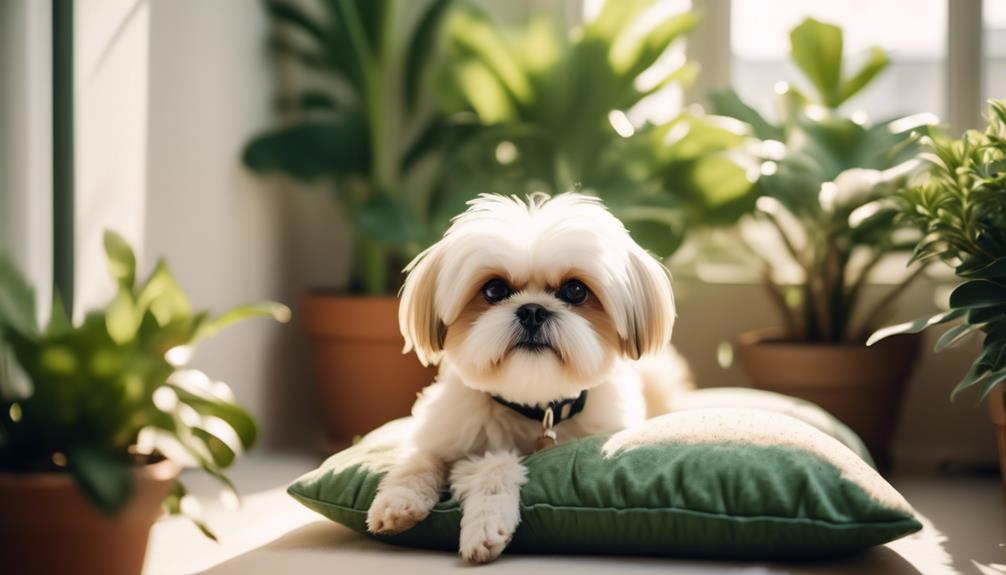
Consider the climate when deciding on an apartment dog, as it can greatly impact their comfort and well-being. Here are some climate considerations to keep in mind when choosing a dog for your apartment:
- Temperature Sensitivity: Some dogs have low cold tolerance and need to live indoors in cool climates. Breeds with thick, double coats are more vulnerable to overheating, while those with short noses, like Bulldogs or Pugs, are more heat-sensitive.
- Noise and Chaos: Dogs with low sensitivity levels can better handle a noisy and chaotic household. If you live in a busy urban area or have loud neighbors, consider a dog that isn't easily startled or stressed by noise.
- Indoor Living: Certain breeds are better suited for indoor living. Dogs that require a lot of outdoor exercise and space may not thrive in a small apartment. Look for low-energy dogs that are calm indoors and don't require excessive physical activity.
- Climate Adaptability: Some dogs are more adaptable to different climates than others. If you live in an area with extreme weather conditions, consider a dog breed that can withstand those conditions or easily adapt to them.
Dogs' Sensitivity and Cold Tolerance

When it comes to apartment dogs, understanding their sensitivity levels and cold tolerance is crucial for ensuring their comfort and well-being. Dogs have varying sensitivity levels, and some may handle a noisy and chaotic household better than others. However, when it comes to cold tolerance, dogs with low tolerance need to live inside in cool climates.
Breeds with thick, double coats are more vulnerable to overheating, while dogs with short noses, like Bulldogs or Pugs, are also more heat-sensitive. Therefore, it's important to consider your dog's sensitivity level and resilience when choosing a dog for apartment living, especially in regions with colder climates.
General Dog Characteristics
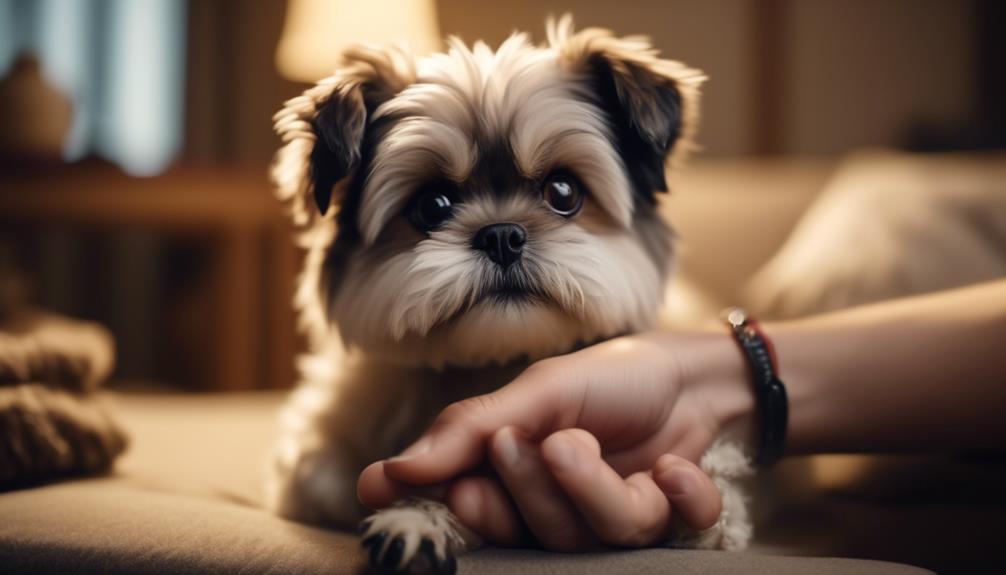
Dogs are known for their unwavering loyalty and unconditional love. They bring joy and companionship to our lives, becoming an integral part of our families. Here are some general characteristics of dogs that make them such wonderful additions to our households:
- Dogs provide emotional support and foster a sense of togetherness, creating a deep bond with their owners.
- Some breeds may be more outwardly affectionate than others, showering their humans with love and kisses.
- High-energy dogs require plenty of exercise and mental stimulation to keep them happy and healthy.
- Vigorous dogs may not be suitable for households with young children or elderly individuals due to their exuberance.
Dogs truly are remarkable creatures, bringing happiness, laughter, and endless love into our lives.
High-Energy Dogs and Compatibility
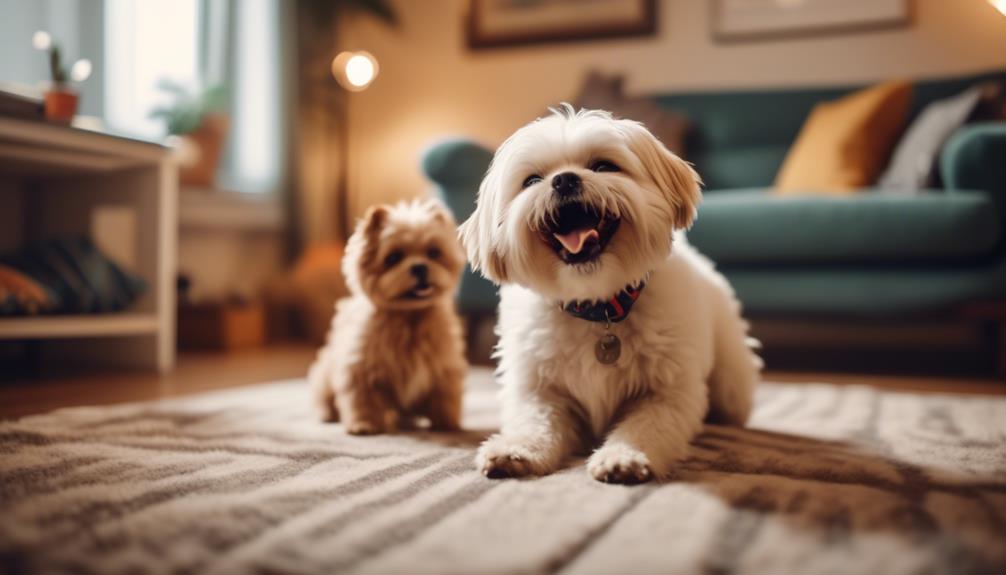
As you explore the characteristics of dogs, one important aspect to consider is the compatibility of high-energy dogs in different living situations. When it comes to high-energy dogs, apartment living can be a challenge. While size isn't the only factor to consider, it's important to prioritize qualities such as being quiet, low-energy, and calm indoors.
However, certain small dog breeds with higher energy levels can still thrive in apartments if given enough exercise and mental stimulation. It's crucial to assess your own lifestyle and energy levels before committing to a high-energy dog. If you have young children or elderly family members, a high-energy dog may not be suitable.
Frequently Asked Questions
What Are the Specific Characteristics of a Boshih That Make Them a Good Apartment Companion?
BoShihs are great apartment companions because of their inquisitive and affectionate nature. They adapt well to apartment living and prioritize qualities like being quiet, low-energy, and calm indoors. They are the perfect size and temperament for apartment living.
Are Boshihs More Suitable for Families With Children or for Elderly Individuals?
BoShihs can be suitable for both families with children and elderly individuals. Their adaptability and affectionate nature make them great companions for all ages. They bring joy and love to any household.
How Can Apartment Owners Ensure That Their Boshih Gets Enough Exercise and Mental Stimulation?
To ensure your BoShih gets enough exercise and mental stimulation in an apartment, engage in daily walks, play interactive games, provide puzzle toys, and consider doggy daycare or hiring a dog walker.
What Are Some Tips for First-Time Dog Owners Who Are Considering Getting a Boshih?
Consider your dog-owning experience and the boshih's sensitivity level when choosing. Prioritize qualities like calmness, low energy, and good manners. Remember, some dogs are easier to train than others. Get ready for an affectionate and inquisitive companion!
Can Boshihs Live Comfortably in Both Hot and Cold Climates?
Yes, BoShihs can live comfortably in both hot and cold climates. Their adaptability allows them to handle different temperatures, but remember to provide proper care, such as shade and hydration in hot weather, and warmth in cold weather.
Which Dog Breed is Better Suited for Apartment Living: BoShih or Borzoi?
When it comes to a perfect apartment companion, Borzoi could be an excellent choice. Known for their calm and gentle nature, Borzois are well-suited for apartment living due to their low energy levels and minimal exercise requirements. On the other hand, BoShihs may require more outdoor space and exercise.
Conclusion
In conclusion, the BoShih is the perfect apartment companion, combining the best qualities of the Shih Tzu and Boston Terrier.
While size is important when choosing a dog for your apartment, it's not the only factor to consider. The BoShih's quiet and low-energy nature makes them ideal for apartment living.
And for those concerned about high-energy small breeds, rest assured that certain small dogs can still thrive in apartments.
So don't let the size fool you, the BoShih is the perfect fit for your apartment lifestyle.




